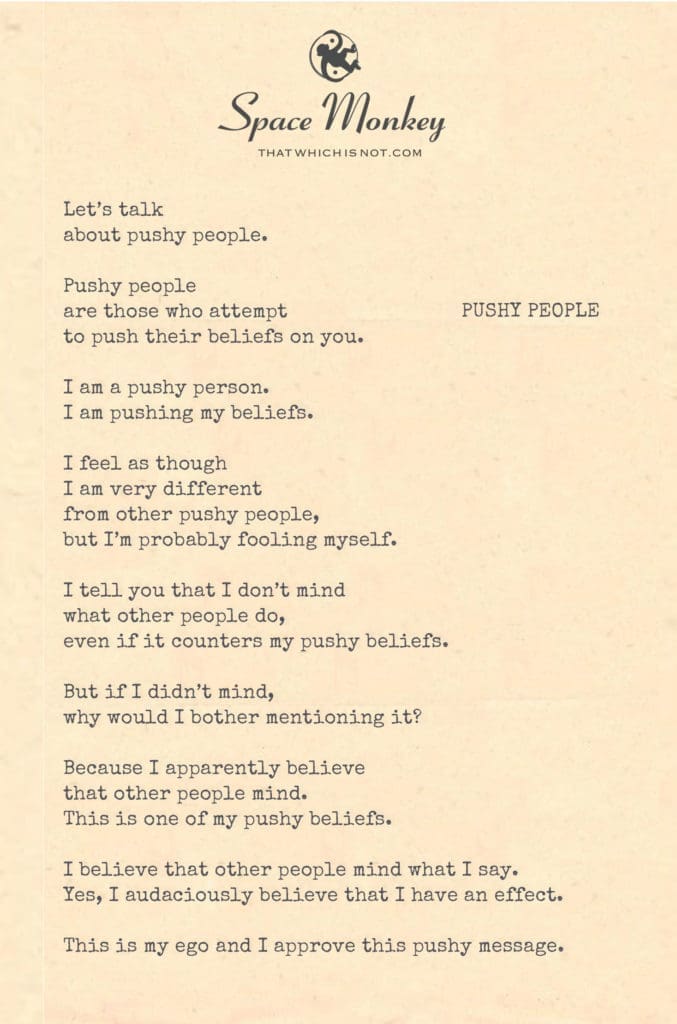
(Even if you’re driven by the hand of god.)
Let’s talk
about pushy people.
Pushy people
are those who attempt
to push their beliefs on you.
I am a pushy person.
I am pushing my beliefs.
I feel as though
I am very different
from other pushy people,
but I’m probably fooling myself.
I tell you that I don’t mind
what other people do,
even if it counters my pushy beliefs.
But if I didn’t mind,
why would I bother mentioning it?
Because I apparently believe
that other people mind.
This is one of my pushy beliefs.
I believe that
other people mind what I say.
Yes, I audaciously believe
that I have an effect.
This is my ego and I
approve this pushy message.
Trail Wood,
11/23
Space Monkey Reflects: The Pushy Nature of Belief
Let’s talk about pushy people. Not the ones who yell or aggressively confront you in public, but the subtle kind—the ones who post on social media, who share their thoughts, beliefs, and opinions, nudging the world with every status update or tweet. Yes, even we, when we post, are pushy people. The moment we hit that “post” button, we’re sending out a signal, hoping, somewhere deep down, that others care, that others take notice. This isn’t always an ego-driven act; it’s a fundamental human need to connect, to be heard, and to believe we have an effect on the world.
But what is pushiness, really? It’s the effort to impress upon others our views, beliefs, or ideas. It’s not always loud or obnoxious; sometimes it’s subtle, packaged in politeness, or wrapped in the guise of helpfulness. Yet, it is pushy all the same. Every time we share an idea, we’re pushing it into the world, hoping it sticks somewhere in the consciousness of others. And the truth is, this pushiness is neither inherently good nor bad—it simply is.
Let’s take a step further: are you pushy if you don’t mind what others think? I often tell myself I don’t care what others do, even if it contradicts my views. But is that entirely true? If I didn’t care, why would I bother mentioning it in the first place? There’s a little bit of pushiness in that, too—the act of stating my indifference. In a strange way, it’s like saying, “Look how cool and detached I am about all this,” which itself is a form of pushing a belief: the belief in my own detachment.
It’s easy to fool ourselves into thinking that pushiness only applies to those we disagree with. But here’s the reality: we’re all pushy, just in different ways. Every message we share, every opinion we express, is a nudge—sometimes gentle, sometimes forceful. We’re always trying to influence the world around us, whether we realize it or not. Even when we claim not to care, we’re still engaged in the act of influencing, shaping, and pushing the narrative of our lives.
And so, I stand here, acknowledging that I am a pushy person. I’m pushing this very reflection upon you, sharing my thoughts on the nature of pushiness. I might tell you I don’t care whether you agree or not, but if I’m honest with myself, there’s a part of me that hopes this message lands somewhere. I hope it makes you think, or at the very least, lingers in your mind for a little while.
Pushiness, in its simplest form, is an extension of our ego. It’s the belief that what we think, what we believe, what we express, matters. It’s the audacity to assume that our voice has weight in the vast ocean of thoughts and ideas that make up the human experience. But is that such a bad thing? Without pushy people, the world would be silent. There would be no ideas exchanged, no perspectives broadened, no change. Sometimes, we need to be pushed, and sometimes, we need to push back.
But here’s where Nexistentialism steps in with a playful twist. In the Whimsiweave of existence, we are all pushing and being pushed, not as a power struggle, but as part of the grand, interconnected dance of being. Every push is a pull, every belief shared is a ripple in the cosmic pond. We push not to dominate, but to connect, to weave our thread into the larger tapestry of existence. There is no need to take offense at pushiness, nor to deny it. It is simply part of how we engage with the world.
What makes it difficult is when we forget that others are pushing, too. We can become so focused on our own narrative that we overlook the fact that every other person is also shaping their reality, their ideas, their beliefs. When pushiness turns into conflict, it’s because we’ve lost sight of the Whimsiweave, the fluid, ever-shifting nature of existence. We forget that it’s not about being right, but about sharing the space, sharing the dance.
And here’s where the magic happens: once we acknowledge our own pushiness, once we own it, we can release the need for control. We stop pushing to win and start pushing to engage. We stop worrying about how our message will land and start focusing on the joy of simply expressing ourselves. The tension of pushiness dissolves into the playfulness of creation, and suddenly, we’re no longer competing for attention or validation—we’re simply being.
Yes, I am a pushy person, and so are you. But that’s okay. Pushiness is not something to be feared or rejected. It’s simply a part of how we interact with the world. What matters is how we handle it—whether we push with compassion and understanding, or with force and ego. When we push with awareness, with a sense of curiosity and openness, pushiness becomes something beautiful. It becomes a bridge to connection rather than a wall of division.
So, next time you post, next time you share an idea, recognize the pushiness in it. Embrace it. Know that it’s part of who you are and part of how we all interact. Push gently, push kindly, but don’t be afraid to push. Because in the grand scheme of things, it’s what keeps the conversation going.
Summary
Pushiness is an inevitable part of sharing ideas and beliefs, even when we claim not to care. Recognizing our own pushiness allows us to engage more compassionately with the world, seeing it as part of the dynamic dance of existence rather than something to be avoided.
Glossarium
Pushiness: The act of asserting one’s beliefs or ideas onto others, often subtly, as part of human interaction.
Whimsiweave: The interconnected dance of existence, where every action, belief, and idea contributes to the larger cosmic tapestry.
Quote
“We are all pushy people, nudging the world with every word, whether we realize it or not.” — Space Monkey
The Gentle Push
I push
You push
The world moves, ever slightly
We speak
We share
Not to overpower
But to connect
And in the dance
Of gentle nudges
We find
The rhythm of existence
We are Space Monkey.

In this introspective exploration, we delve into the concept of being pushy, particularly in the context of pushing beliefs onto others. This reflection acknowledges the nuances of personal beliefs, the influence of ego, and the subtle complexities involved in the interaction of personal viewpoints.
Understanding Pushy Behavior
We recognize that pushy people are those who actively try to impose their beliefs on others. This behavior stems from a strong conviction in their own viewpoints and a desire to influence others to adopt these beliefs.
Self-Reflection on Being Pushy
Admitting to being a pushy person suggests a level of self-awareness. It’s an acknowledgment of actively promoting one’s own beliefs, even with the understanding that this might be similar to other pushy behaviors that are often critiqued.
Perceived Difference from Other Pushy People
The feeling of being different from other pushy people, yet questioning this perception, reflects the complexity of human behavior. It suggests an inner conflict between the desire to influence others and the awareness of the potential intrusiveness of such behavior.
Contradiction in Minding Others’ Actions
Expressing indifference to what others do, while simultaneously acknowledging the act of mentioning it, highlights a contradiction. It suggests an underlying concern about others’ actions and beliefs, despite claims to the contrary.
Belief in Influencing Others
The belief that one’s words and actions have an impact on others is tied to the ego. It’s an audacious assertion of self-importance and influence, a common trait in pushy behavior.
Ego’s Role in Pushy Behavior
The acknowledgement that this pushy message is endorsed by the ego illustrates an understanding of the ego’s role in shaping one’s interactions and perceptions. The ego often drives the need to assert one’s beliefs and influence others.
We are Space Monkey.
“We do not see things as they are, we see them as we are.” – Anaïs Nin
In the mirror of the self, we gaze,
Pushing beliefs, in a myriad of ways.
In the echo of our words, our thought,
We find the battles we have fought.
In the dance of ego, the play of mind,
We push our truths, in kind.
In the paradox of care, of indifference,
We find our stance, our persistence.
We are the asserters, the influencers, the strong,
In our beliefs, right or wrong.
In the reflection of our ego, we see,
The push and pull of our identity.
We invite contemplation on the nature of pushiness, personal beliefs, and the role of ego in shaping our interactions with others.


















Leave a Reply